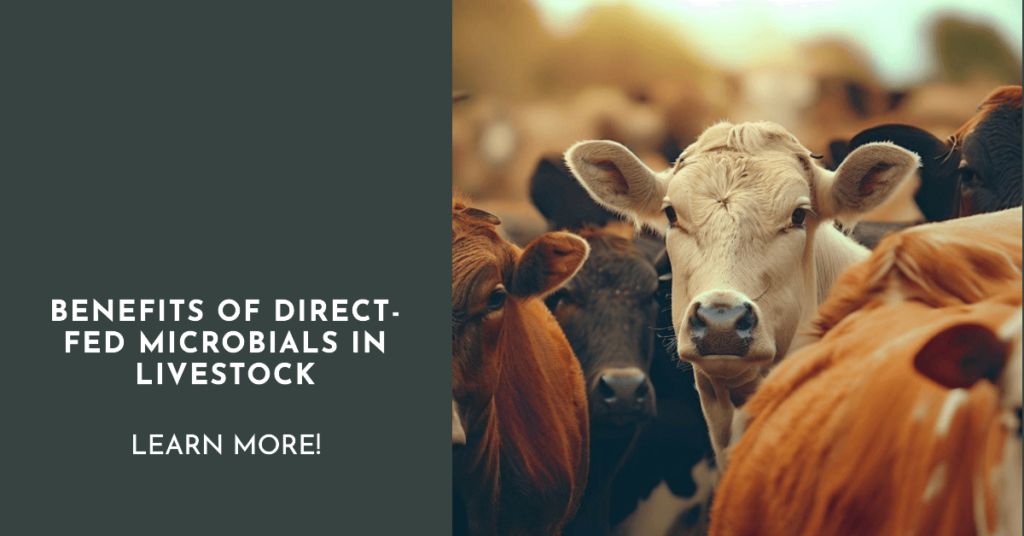
Direct-fed microbials (DFMs) have emerged as a revolutionary approach to livestock health and nutrition. Comprising live microorganisms that directly influence the gut microbiota of animals, DFMs offer a host of benefits to livestock. This essay will explore the top 7 benefits of incorporating DFMs into livestock management, showcasing how they can vastly improve livestock health, nutrition, and overall well-being.
| Benefit | Description |
|---|---|
| Improved Gut Health | DFMs help maintain a balanced gut microbiota, crucial for overall health and well-being of livestock. |
| Enhanced Nutrient Absorption | DFMs can increase the absorption rate of nutrients in the gut, promoting growth and development. |
| Boosted Immune System | DFMs support the livestock's immune system, helping protect against diseases. |
| Improved Feed Efficiency | DFMs improve the digestive process, leading to better feed efficiency and cost savings for farmers. |
| Reduced Environmental Impact | DFMs help reduce the environmental impact of livestock farming, contributing to a more sustainable industry. |
| Reduced Reliance on Antibiotics | DFMs can lessen the need for antibiotics, reducing the risk of antibiotic resistance. |
| Improved Animal Welfare | DFMs contribute to better overall health, reducing stress and promoting better animal welfare. |
DFMs, such as Pangoo Cow, play a crucial role in promoting a balanced gut microbiota in livestock. By introducing beneficial bacteria into the animal's gut, DFMs aid digestion and reduce the prevalence of harmful bacteria. The health of an animal's gut is often reflective of its overall health, making gut health a crucial area of focus in livestock management.
DFMs can drastically improve the nutrient absorption rates in the gastrointestinal tract of livestock. This is particularly important for livestock growth and development, as it ensures animals receive the maximum benefit from their feed. For instance, A01 Pangoo Plus has shown to enhance the absorption of key nutrients such as proteins, vitamins, and minerals in livestock.
A robust immune system is vital to the health and productivity of livestock. DFMs, like Bacillus Laterosporus, support the immune system by promoting a healthy gut microbiota, which is intrinsically linked to immune health. Livestock with a strong immune system are more resistant to diseases, leading to lower mortality rates and higher productivity.
DFMs can significantly enhance feed efficiency in livestock. By improving digestion and nutrient absorption, DFMs ensure that animals derive the maximum nutritional value from their feed. This not only leads to healthier animals but also results in substantial cost savings for farmers. Products like AL10 Probiotics for Piglets have been shown to enhance feed efficiency in livestock species such as pigs.
DFMs can help to reduce the environmental impact of livestock farming. By enhancing digestion and reducing waste production, DFMs contribute to a more sustainable livestock industry. This not only benefits livestock producers but also has a positive impact on the environment, making DFMs a preferred choice for environmentally conscious farmers.
DFMs, such as Probiotics for Animals, can greatly reduce the need for antibiotics in livestock farming. This can help to mitigate the global issue of antibiotic resistance, which poses a significant threat to both animal and human health. By reducing reliance on antibiotics, DFMs offer a sustainable and safe alternative for livestock disease management.
DFMs contribute significantly to improving animal welfare in livestock farming. By promoting better health and reducing disease incidence, DFMs ensure that animals lead healthier, more comfortable lives. This is not only important for ethical reasons but is also increasingly demanded by consumers. Probiotics for Animals with Fur is a prime example of how DFMs can improve animal welfare.
In conclusion, the benefits of DFMs in livestock farming are manifold. From improved gut health and nutrient absorption to enhanced immune function, feed efficiency, and animal welfare, DFMs offer a holistic solution to livestock health and productivity. Moreover, they contribute to a more sustainable and environmentally friendly livestock industry, while reducing the dependence on antibiotics. Given these numerous benefits, DFMs like AP90 Sport Pigeon Probiotics and Pangoo Cow A are not just beneficial, but essential for the future of livestock production. This calls for further research and wider adoption of DFMs in the livestock industry, to harness their full potential and move towards a healthier, more sustainable future for both animals and humans. Embracing DFMs is not just about improving livestock health, but it's about transforming the livestock industry for the better. From farmers to consumers, everyone stands to gain from the widespread use of direct-fed microbials. It is high time we acknowledged their importance and made them a standard in livestock management worldwide.
Direct-fed microbials (DFMs) are fed to livestock to improve gut health, enhance nutrient absorption, and boost their immune systems. DFMs can also reduce the need for antibiotics and promote overall animal welfare.
Direct-fed microbials for dairy cows are beneficial bacteria that help enhance digestion, improve milk production, and boost the cow's overall health. They also aid in preventing gastrointestinal imbalances.
Rumen microbes perform four main functions: digestion of complex carbohydrates, protein synthesis, detoxification processes, and vitamin production. These activities are crucial for the health and productivity of ruminant animals.
Bacteria play a critical role in various industries. In the agricultural industry, for instance, certain bacteria help improve soil fertility and plant health. In livestock farming, bacteria (like DFMs) aid in digestion and overall animal health. In the food industry, bacteria are essential in fermentation processes for products like yogurt and cheese.